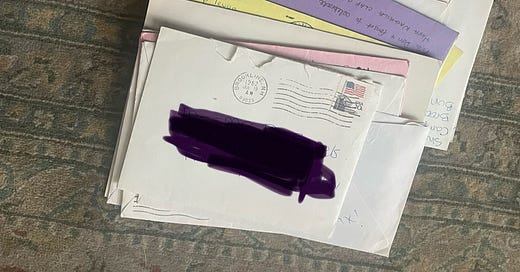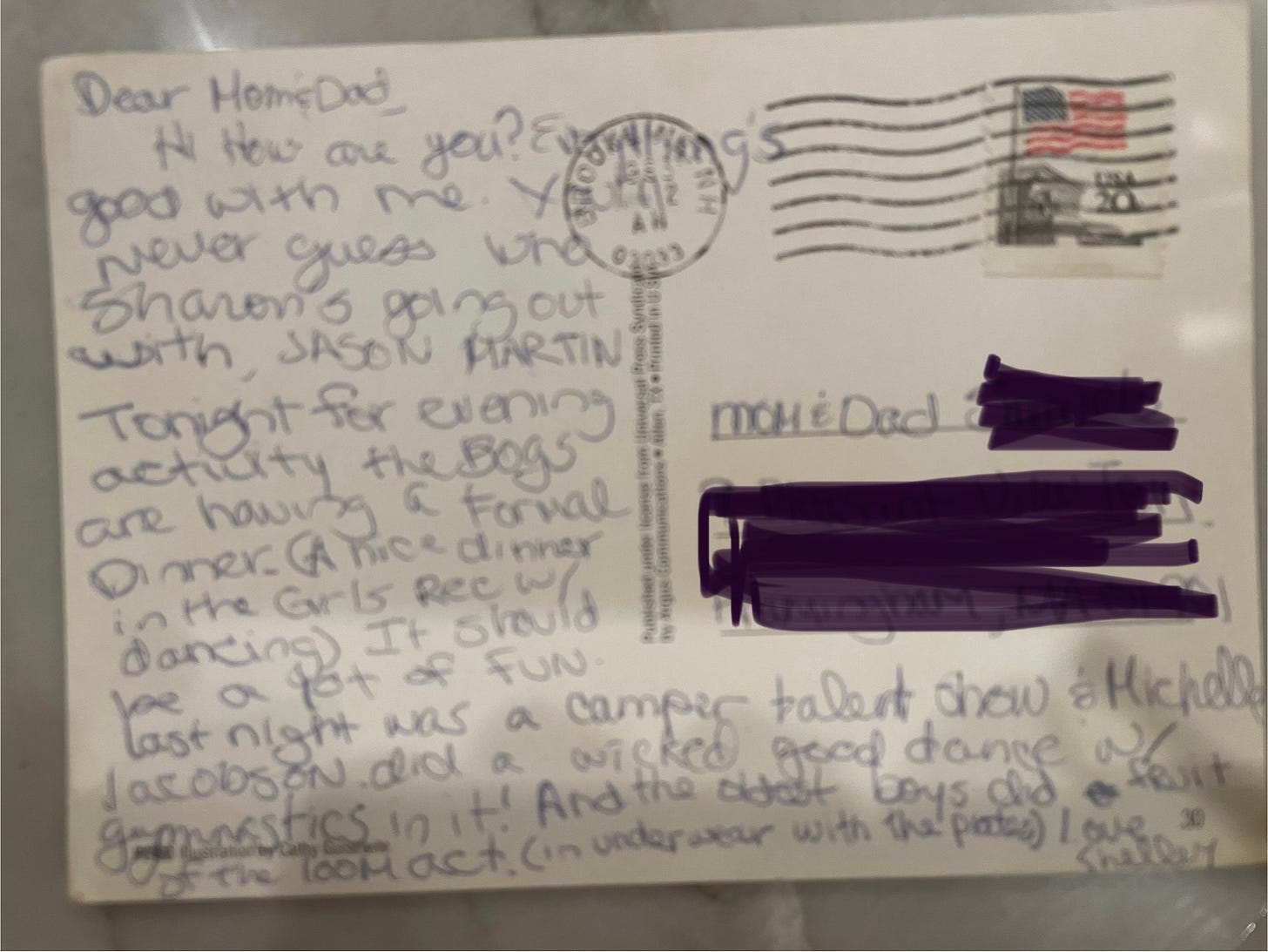How camp letters uncovered new truths about my childhood
And more understanding about myself and peoplehood
My mom gave me the stack of camp letters she kept from the 1980s, bound together by a rubber band. They were decorated with 20-cent stamps from 1982 with handwriting to match the time. Remember exploring how you held the pen, discovering how you could find your own signature writing style, like exploring how to write the letters differently, like making bubble letters, or instead of the traditional ‘a’, you would write it like an upside-down number six? Or the curly ques at the bottom of a ‘y’ or a heart shape over the ‘i’s. It’s a lost art. These letters were filled with my adolescent handwriting.
The stationery varied in cuteness from blue-lined paper with a perfectly diametrically shaped yellow circle to represent the sun, with kids paddling a canoe on the lake. Mrs. Grossman’s stickers were coveted and sometimes used to decorate the paper and envelopes from rainbows to hearts to teddy bears to lollipops in the vibrant variations of colors. I adored those stickers and kept them safely in my photo album to look at and trade with friends.
Growing up, going to the same Jewish summer camp every summer for eight weeks was a break for us as a family and a tradition instilled from my dad, who also went to camp growing up. I went for 13 years along with my younger sister.
Until I read those letters, my memory had a sour taste because I remembered the awkward social situations, like not making the volleyball team or getting sucked into dramas about other girls being cliquey and leaving others out. There were always “mean” girls, whether at school or camp, and I don’t recall feeling comfortable anywhere. We all wanted to be liked, have the right clothes like stirrup or parachute pants, be popular, and have a boyfriend.
The pressure after evening activity could be stressful! We would stand in the dark on the basketball court, either to continue socializing or waiting for a boy to make the move, either holding hands or getting a kiss to seal the deal of “going out” with someone.
It was simply one big awkward time, but it instilled a strong Jewish pride through singing, celebrating Shabbat every week, and the comfort of not feeling like you had to hide your identity.
I was anxious about reading those letters, thinking it would unlock some painful memories that I had hidden away, but what I found was astonishing.
They all began with a bright and cheery, “Hi, how are you?” and then launched into how my younger sister was doing. “Sharon didn’t get her package today, or I think Sharon might be homesick, or I’m not sure Sharon is making any friends.”
I barely remember her even being at camp, let alone keeping tabs on her!
These narratives I kept from my childhood that have stayed with me may not have been the whole truth after all.
Are the past moments others have told us or ones that we create in our minds? Do we bury the truth of events in our psyches, or is it only the feelings we decide to keep?
It was healing to read these letters and reframe my childhood in a new way, with the seeds planted of Jewish pride from all those years ago. For me, it’s not complicated to be multilayered and complex, it’s where I prefer to be in a drive for knowledge and creativity. I’m more than one thing, yet I keep coming back to the part of me that is Jewish since October 7. I can’t deny it feeds my lens on how I view the world today.
It’s not political to be Jewish, even though many think they have the permission to make it so.
I’ve been mostly gone from the Jewish traditions for the last 12 years or so since I found spirituality on a path of mostly Buddhism. I grew tired of the constant remembrance of how we survived the Holocaust, or walking into a darkly lit temple where I worked in 2004, the wall commemorating the dead, it became detached from living. I found mixed messages of inclusivity, yet we need to remember to stay safe together, insulated from the rest of the world. I grew tired of the rote, “This is the way we do it because it’s tradition and we have to maintain it because of our ancestors, and we are here today because of them,” underlying message at every turn.
I read this beautiful, truthful article by Taffy Brodesser-Akner in the New York Times, This Is the Holocaust Story I Said I Wouldn’t Write.
For years, my friend’s father asked me to recount his childhood escape from the Nazis. Why did it take me this long?
That is the problem with the Holocaust — though, of course, not its main problem, which was that it was the Holocaust. The problem is that you could grow up thinking about it all the time and still not even be able to imagine how bad it was. There is no bottom to the depths of cruelty and depravity that you can learn about if you just ask the right question of the kind, calm man sitting next to you, but you have had such a privileged life that you don’t even know which questions to ask. And the questions I can formulate are so rude and raw that they threaten to make life just a little more awful than it is right now for someone who has, frankly, been put through quite enough and does not have to sit for my demoralizing and morbid and even lurid curiosity. Besides, how could any survivor give me a satisfying answer to: How do you live knowing that people are capable of this?
What was the point of all of this Holocaust education, if, while you are still alive, a survey by the Claims Conference found that 15 percent of American adults under 30 believe the number of Jews murdered in the Holocaust is “greatly exaggerated,” and that 24 percent believe that fewer than two million Jews were killed during the war, and 48 percent of all American adults surveyed could not name one of the concentration camps or ghettos or other of the more than 44,000 killing sites that the Nazis used to torture and murder Jews?
Is there any rational way to explain why, from 2018 to 2023, right here in New York State, where the largest number of Jews outside of Israel live, hate crimes against Jews rose by 89 percent, so that in 2023 they made up 44 percent of all hate crimes?
And though I do want antisemitism to be punished and banished, how am I supposed to feel comforted by an administration that seems to be invoking it to fight a culture war that has nothing to do with Jews, while at the same time warmly embracing not one but two guys who recently did the ol’ “Sieg heil" in front of large crowds? Is the actual longest Jewish tradition that we get scapegoated even by the people who are pretending to save us?
And is there any way the world can experience economic or political turmoil without deciding to lay it at the feet of the Jews?
Taffy grew up in an insular community, but I could relate to the consistent barrage and pressure to simmer in fear. We belonged until people decided we didn’t assimilate enough or contribute enough or we ruled the banks or we ruled Hollywood or whatever - yada yada.
For these and other reasons, it pushed me away.
For me, there was no spiritual path, I wish I knew about Kabbalah way sooner, in my Jewish upbringing so I went elsewhere and found it with Ram Dass. Ram Dass was wonderful about incorporating his Jewish side and all the others, his knowledge was vast and deep, all with immense authenticity and humor.
One day, when I was filled with grief, I decided to clean my bathroom to do something other than lie in bed and cry, and as I opened YouTube to find an uplifting talk, I clicked on a Ram Dass talk from the 90s. Vibrant and clear, he says, “And here I am in Palm Springs.” Twice. And then he went on to tell a Jewish joke about death. In case you missed it, I live in Palm Springs.
Out of all the talks I could have played, this was the one. My spirit was lifted that day as I cried, listened to him, and made the bathroom sparkle.
And interestingly, all the teachers I have studied with are also Jewish-born, even if they don’t mention it, because even in those communities it’s made political. Only for Jews comes the “what-about-ism,” and when you have to defend your heritage, it must be exhausting, so maybe they only use the Yiddish they learned from their grandparents in private. I can’t imagine what it’s like to be a public spiritual teacher who has devoted so much to so many individuals and communities and yet they have to hide that part of themselves. Maybe I’m way off base. It’s none of my business anyway.
Or maybe I’m completely wrong and they are disconnected completely, one teacher I spoke to in particular seemed to be, but the others, I’ll never know.
I didn’t always have so much compassion for these teachers, believe me, I was in rage with them for a while for not speaking up in the way I wanted them to. I’ve let it go. They are human too, on their own path and so I soften my anger and sadness. It doesn’t discount all the deep learning I have acquired from them.
Yesterday, I had a small group of students who sat with me for a meditation space when one of them disclosed to the group that he was a JewBu. And another one had a Hebrew tattoo, and the other one said she couldn’t manage the anger lately that she was feeling since October 7.
I don’t know how we all came together, but we did. And the space became a place of real sangha. We could have stayed for another hour consoling and supporting one another. We can hold it all because we have to and it is our birthright to have joy and live our lives with ease.
In the Chassidic tradition, the “male aspect,” is chesed. (Kindness, bestowal, nurturance.) Surprising to some is that the “female aspect” is protection, ferocity, forbearance.) We all share the ability to access both. Wisdom, as I see it today, is knowing which to apply and when. - Peter Himmelman
It all belongs. You belong. We all belong. We are all connected and here together on this planet, whether we like it or not, and we are all going to die someday. I will continue to exist in the space in between it all - a centrist, or maybe we will begin calling it the third space.







Well said, Shelley. I’m not Jewish—or religious at all—but it angers me every time I hear our “president” use the excuse of fighting antisemitism to propel his crazy witch hunts because I know he doesn’t care about Jewish people. It’s just a convenient excuse, and how disrespectful is that?
I also like what you say about our memories and what our minds choose to remember. It really does come down to recalling how we felt more than what actually happened (in many cases, but not all).